You’re in Trade School Harry!
Welcome to Dragon’s Gate College. Here you will learn all the skills you need to become a contributing member of secret society. Upon Graduation we have a 100% success rate in placing you in a job as well. Just remember to tell your friends what house trained you to be the best of the best and don’t do anything to sully our name; we have our reputation to uphold you know!
In Dragonsgate College you take on the role of a head of one of the great houses of the College. Your goal is to oversee your house, hire staff to train your students, and develop your house’s reputation to make it the most glorious in all of Dragonsgate.
I’m sure you can already start to sense it, but this game seems to borrow heavily from the beloved-book-series-gone-movie-sensation, Harry Potter. While there may not be a sorting hat, Dragonsgate is often falling into the “visually similar to but legally distinct from” category. From a “secret chamber” to a tournament with a very fiery looking goblet at the end to even house elves, er I mean “imps” who will help you on your quest, there are many thematic and visual similarities. While I found this entertaining but somewhat disappointing from a creative perspective, it did not detract from what I believe is a very well crafted game system. So let’s talk about this dice placement game and see what is so bewitching about it.
That’s How I Roll.
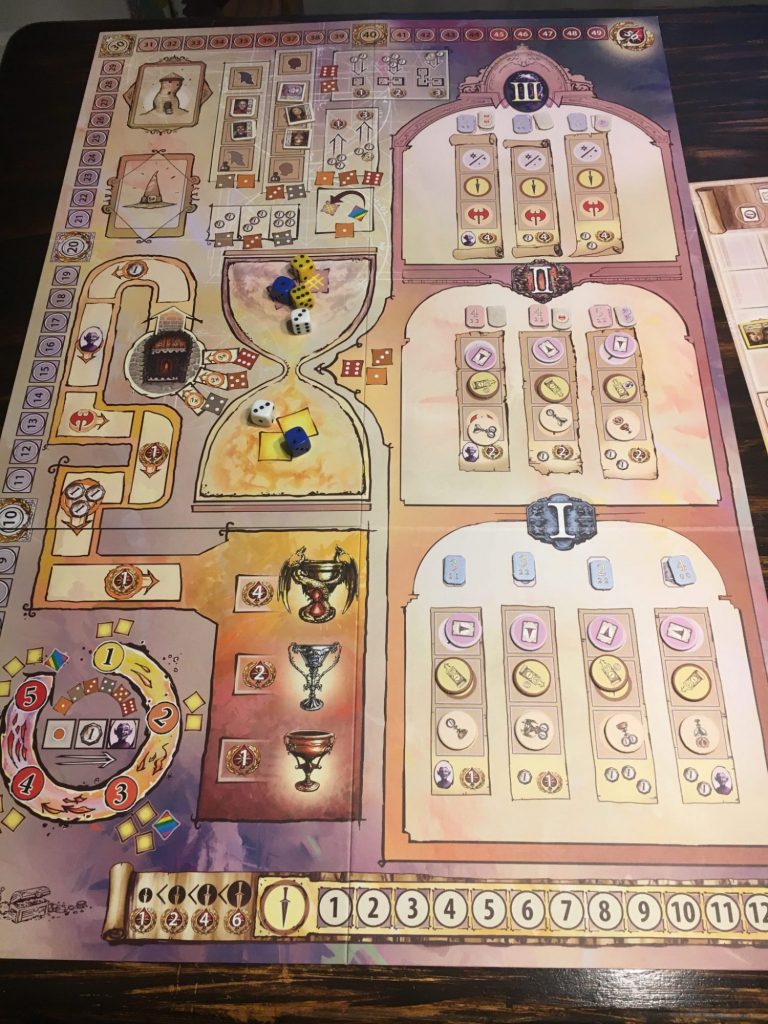
Dragonsgate College follows your house’s rise to fame over one year of schooling. It is broken into 5 rounds played out over a series of turns. The dice are everything in Dragonsgate. Players take turns drafting the dice from a pool and playing them to utilize the various actions available on the game board. The trick is each action can only be activated with certain numbers. You can perform such actions as recruiting teachers or students to your house, building new structures in your house, or working your way through a tournament to gain riches and glory for your house. You can also place your apprentices into jobs based on one of the three skill sets – wizard, warrior and rogue – if you meet the requirements. I will share more on this in a moment.
Don’t have the dice number you need for a certain action? No problem! With the aid of a helpful Imp you can add 1 or subtract 1 from any dice roll to get the number you require like… well, like magic.
There is one other nice trick to the dice placement aspect of this game in the form of house specific dice. Each player gets to start the game with one of their personal dice in the dice pool. If another player selects their die from the pool, the player who owns that die will get a free action on that player’s turn using the dice number as well. This system is very ingenious as it puts a bit of pressure on the players to decide if they want to give their opponents extra actions in exchange for the die face they need. This forces you to really consider what actions to take and when.
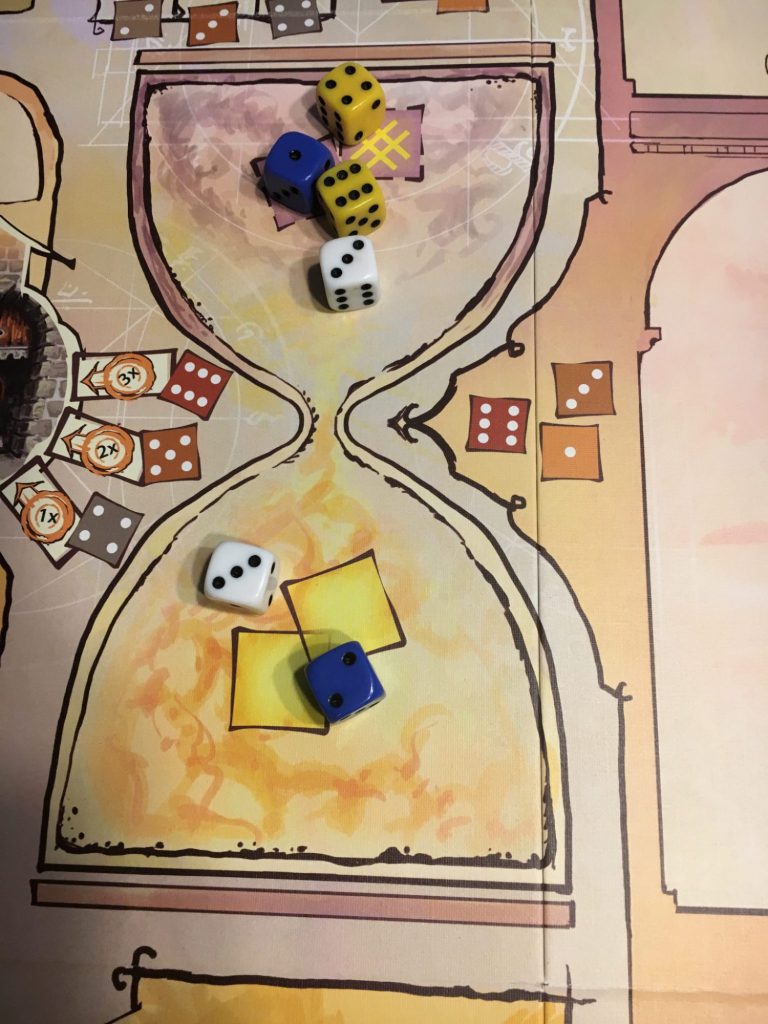
Do you even Wizard Bro?

Like all good Euros or dice placement games, it’s all about the actions and Dragonsgate College is no exception. There are a plethora of different actions you can take from simple ones like adding buildings to your house grounds or gaining some coin to pay for upgrades, to more unique actions that really give the game its flavor. Each of these actions have specific dice requirements to activate. So if you don’t have the right dice for this round, you can either try to change them with Imps or you are forced to rethink your strategy.
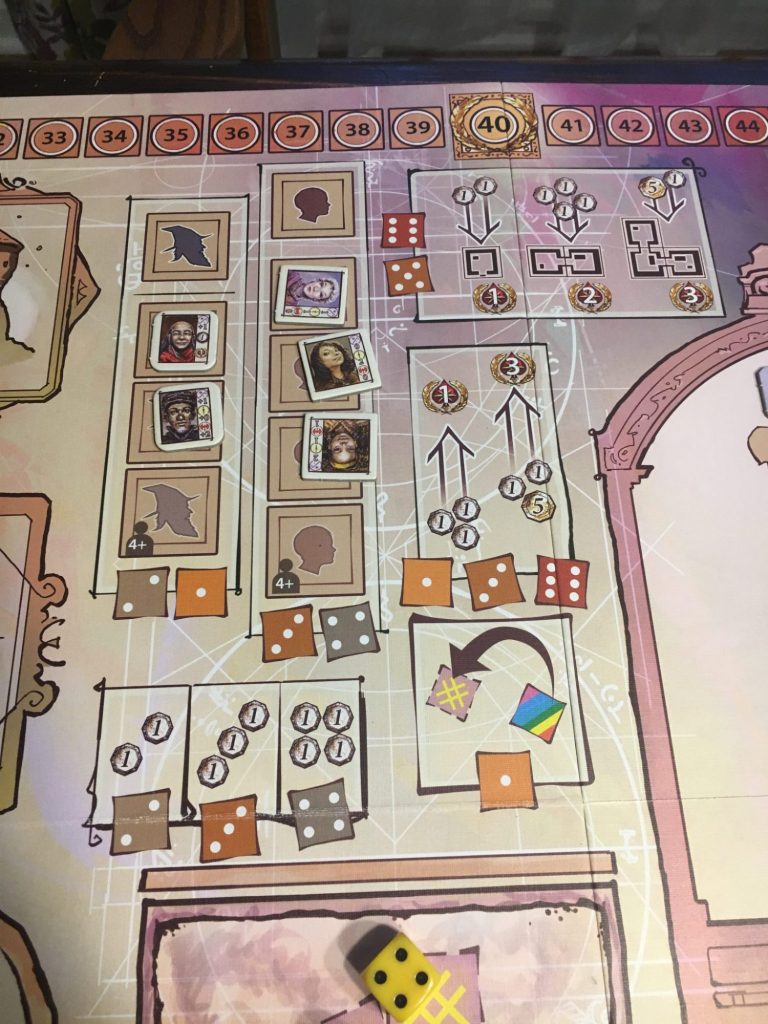
I really enjoyed some of the thematic actions you could take like sending your house through a very “goblet of fire”-esque tournament to gain prestige and even the action of selecting which building you wanted to really bring your playstyle and house’s focus to light. The recruiting and job placement actions, however, make up the meat of the game and are what Dragonsgate College is all about.
As I stated, in Dragon’s Gate you are effectively a trade school, training apprentices and sending them out to work in respective tasks. This is the heart of the experience and what will set apart a good house from a great house. The entire right side of the board is dedicated to showcasing the various jobs available in the pseudo wizarding world. There are three types of jobs based on the the various skills in the world. You can send your apprentice to be a wizard, rogue, or a warrior. Each of these jobs has a particular bonus associated with it as well as a specific bonus for the specific job you can complete. To determine if your apprentice is able to complete the job they must meet the required skill points in all three skills as indicated by the small numbers above each job. There are three tiers of jobs, each with higher skill point requirements and better rewards.
Before I go any further, it is important to explain skills and how you develop them for your house. At the start of the game you will select 2 of the 3 starting professors, and all three of your apprentices and place them in your house. Professors offer different skills and bonuses to your house depending on their stats. These will become your overall house stats. When you send an apprentice on a job they add their personal stats to the the overall house stats to arrive at their personal skills level. If their personal skills meet or exceed the required skills from the job they are able to take that job and will go off to work and spread the word about the awesome school that made them so skilled at magical labor.
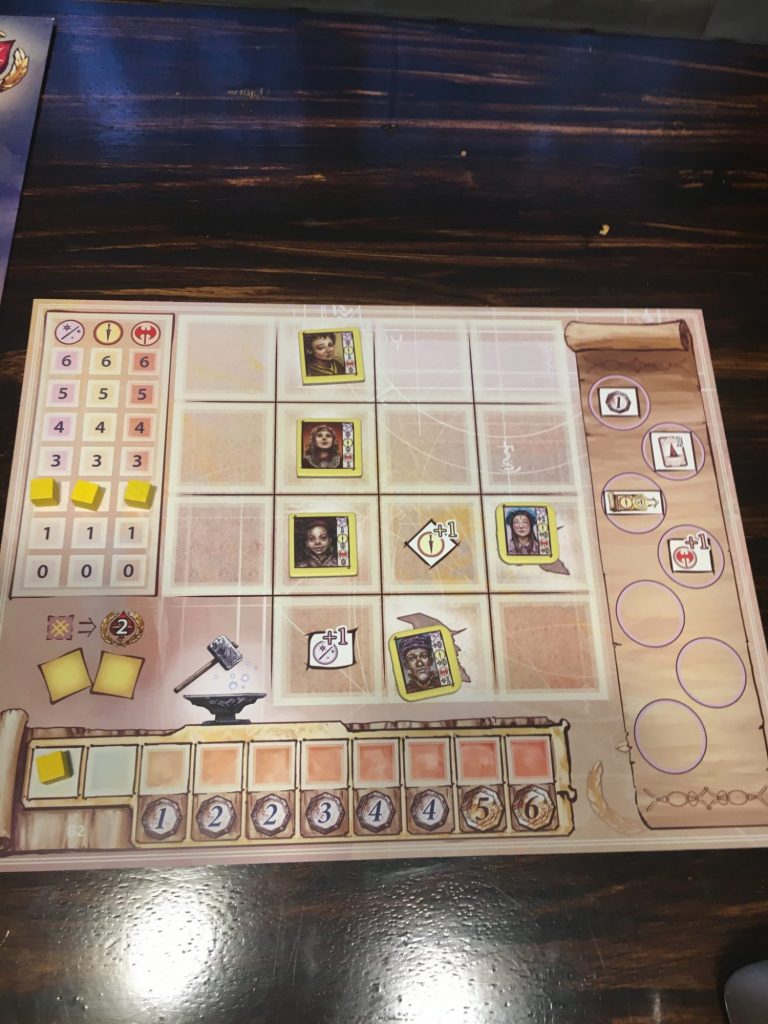
For instance, in the example above, if I wanted to send an apprentice to complete a job that was a big 4 little 1 and little 1 and selected the rogue job, my apprentice would need to have at least 4 skill points in rogue and 1 in both of the other skills. To explain it another way, whatever job you pick will tell you the numbers you need and whatever skill specific bonus you pick will tell you what the BIG number is for determining if you have enough skill points.
As the game goes on you will be able to take actions to gain better, more skilled apprentices and teachers to raise the level of your house so you can tackle more glorious jobs. This was by far my favorite aspect of the game. It was enjoyable to determine which direction I wanted to specialize my house in and plan which apprentice to send out to what job to reap the most and right rewards for my immediate and long term growth.
The game continues with players taking actions and completing rounds until the 5th round is complete. Then players will finalize their victory point totals by calculating a few factors noted on a handy dandy card to see which house had the best year at Dragonsgate
Overall Thoughts

Traditionally, I usually do not love “euro” style games with limited player interaction. Dragonsgate College was a rare exception to this rule for me however as I felt the player owned dice element offered a great deal of interaction that I enjoyed. The rounds flow simply and actions are relatively well laid out and enjoyable to embark on.
There were some issues with the art on two fronts. The first was a problem that many similar Euro games suffer from. There were so many symbols (particularly on the building tiles) that it was impossible to tell which meant what at a glance. I found myself having to return to the manual over and over to verify what each piece did as often the same symbol meant a similar but distinct thing from the same symbol elsewhere. This was frustrating and took me out of the enjoyable atmosphere the game created and placed me into a tedium of checking the rule book.
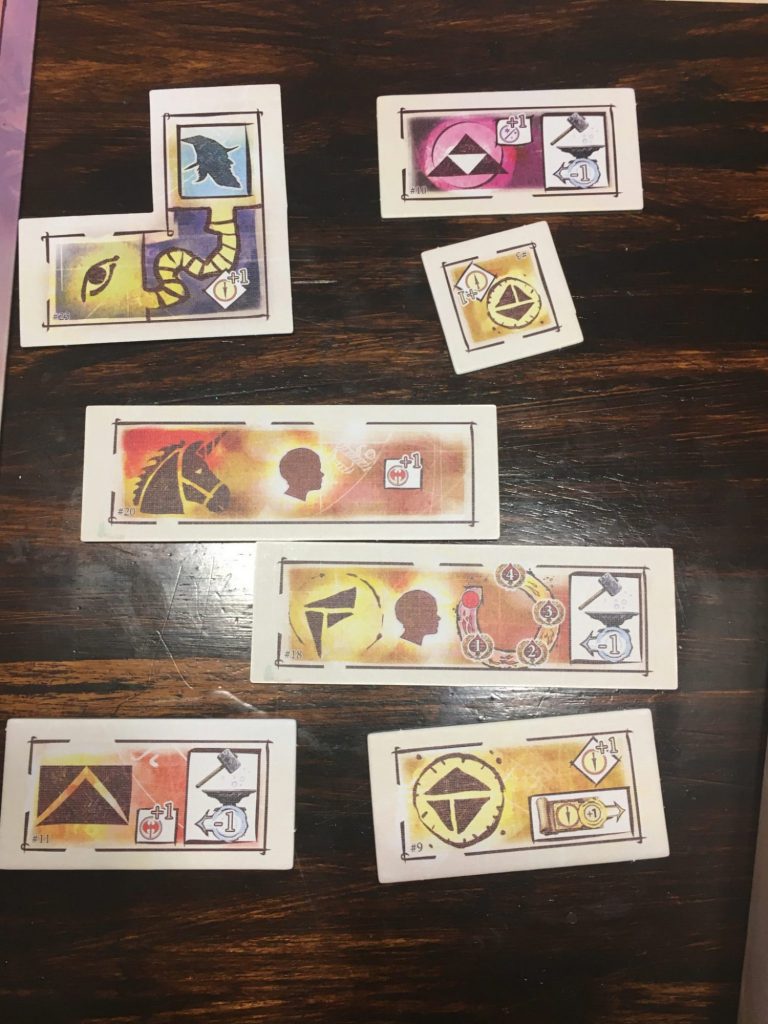
The other issue with the art was more of a personal opinion. While I loved the game and atmosphere it created, I was not always in love with the art itself. While the apprentice and teacher tiles were very well crafted, the art on the overall board and room tiles was underwhelming and vague at times. This critique is purely aesthetic and my opinion. I believe the art was an intentional choice and I feel that “vibe” is held strongly throughout the whole of the product but for me personally I feel Dragonsgate could have been more eye popping with a more realistic or detailed art style.
Overall, Dragonsgate is a solid game that I would not have qualms about bringing to game night. It is easy enough to teach and plays smoothly in a decent time frame.
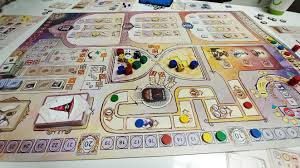
Dragonsgate College
Category: Dice placement
Pros: Thoughtfully crafted player “owned” dice mechanic. Immersive and fun theme.
Cons: Some symbols on items and buildings are ambiguous. Art style may not be for everyone.
Rating: 6/10 This a very enjoyable game that I felt had a great mechanic. While the art may not be bewitching for everyone that is a minor blemish on a very nicely crafted game that fills a nice niche in the wizarding genre of games.


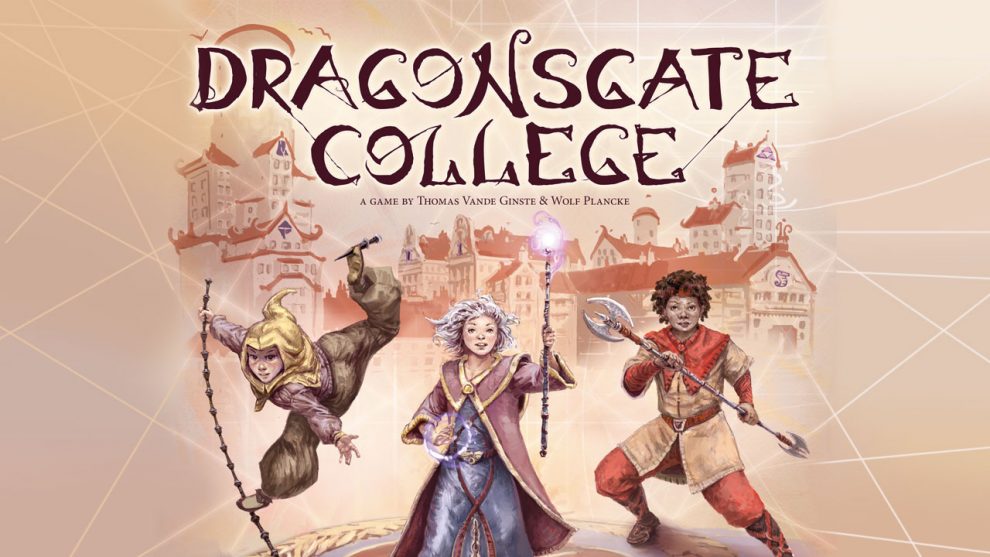




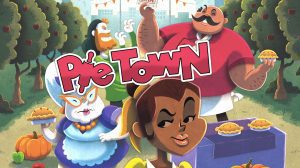




I don’t find Dragonsgate College to be fun with 4 players. In my experience towards the end of the game you’ve swapped out all the white dice, so every action comes with a secondary action and the last couple rounds are like 2 rounds each. It can get tiring. And there’s a limited number of times most actions can be taken, so by halfway through our last round in the game I played there were no actions of value worth doing. I would not play this with 4 players again.
My experiences with 2 or 3 players was much better and very enjoyable.